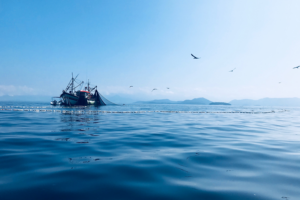SFP 2023 Reduction Report shows continued drop in fisheries performance, highlighting need for improved fisheries management

Sustainable Fisheries Partnership (SFP) has released two new reports that show declines in the performance of key reduction fisheries for the sixth year in a row, highlighting the need for more active and long-term industry engagement to ensure good fisheries management.
Two more fisheries dropped into the “poorly managed” category: Chilean jack mackerel–SE Pacific (Peru) and blue whiting–NE Atlantic (which dropped after moving up in 2022). While most fisheries assessed in the reports continue to be reasonably well-managed or better, performance has been steadily dropping since 2018.
“Since 2018 we have unfortunately seen a steady decline globally in the performance of key fisheries supplying marine ingredients, due largely to persistent management issues,” said Dave Martin, program director at SFP. “While all stakeholders need to be engaged in supporting improvements, we are looking to the seafood industry to take the lead in fostering long-term partnerships with fisheries and supporting improvements to ensure sustainable fisheries can meet growing customer demands and remain healthy in the face of climate change.”
The 2023 reports mark the 14th edition of the SFP assessments, which evaluated key fisheries based on sustainability scores in FishSource, SFP’s public database of fisheries information. Like last year, the 2023 evaluations were conducted in two phases, to better align with the timings of the release of key management measures and stock assessment information for each fishery.
Despite relatively good stock health and ongoing improvement efforts, persistent management issues globally continue to hinder fishery performance. This includes a lack of precautionary management (e.g. robust management plans and harvest control rules), and especially a lack of agreement and implementation of effective joint management strategies for transboundary stock like NE Atlantic blue whiting. Especially in the face of climate change, managers should define ecosystem-based long-term strategies and objectives to safeguard fish stocks and associated trophic chains.
“We welcome the report and SFP’s call for further leadership within the seafood industry to generate positive changes that lead to better-managed fisheries,” said Jorge Diaz Salinas, global sustainability director at Skretting. “We acknowledge our responsibility and will use the information to identify and act, together with other partners, on fisheries with potential for social and environmental improvement that can sustain the increasing demand for marine ingredients. Moreover, the addition of the environment and biodiversity scoring will also be used as a tool to make better decisions in our operations.”
The most recent report is also the first to include FishSource environment and biodiversity scoring, which goes beyond traditional fisheries management to focus on bycatch and potential fishery impacts on endangered, threatened or protected (ETP) species and marine habitats and ecosystems. While overall scores are reasonably good, the scores also highlight that all the fisheries assessed in this report have room for improvement on these issues.
“Cargill wholly supports the publication of these reports and welcomes the addition of the Environment and Biodiversity scores, which provide an important overview of the key fisheries used in the production of fishmeal and oil,” said Marny Ferrara, leading Cargill’s Aqua Nutrition global marine ingredient merchandising and risk management. “This helps us to purchase responsibly managed and sustainably sourced fishmeal and fish oil from our suppliers and propose fishery improvement projects (FIPs) for improvements where needed. This is essential to meeting our commitment and our customers’ expectations of sustainable marine ingredients.”
Now that you've reached the end of the article ...
… please consider supporting GSA’s mission to advance responsible seafood practices through education, advocacy and third-party assurances. The Advocate aims to document the evolution of responsible seafood practices and share the expansive knowledge of our vast network of contributors.
By becoming a Global Seafood Alliance member, you’re ensuring that all of the pre-competitive work we do through member benefits, resources and events can continue. Individual membership costs just $50 a year.
Not a GSA member? Join us.



